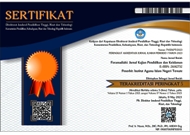Implementasi Pendidikan Karakter dalam Pembelajaran Bahasa Arab bagi Peserta Didik Cerdas Istimewa (PDCI) di MTSN Pare
Abstract
This study aims to describe the implementation of character education in Arabic learning for special intelligent students (PDCI) at MTsN Pare with the research sub-focus covering teacher planning, applied character values, supporting and inhibiting factors in learning Arabic. This study uses a descriptive qualitative approach. Data collection methods are interviews, observation and documentation. The data analysis technique used is an interactive model that includes four interrelated components, namely data collection, data reduction, data presentation, and drawing conclusions. Checking the validity of the data using two criteria, namely extending the involvement and triangulation. The results showed that the planning of the Arabic language teacher in charge of the PDCI class in implementing character education in the form of making a syllabus and RPP (Learning Implementation Plan) based on character education, the character values developed in learning Arabic at the school were religious, honest, disciplined. , responsibility, caring (tolerance, mutual cooperation), polite, confident and democratic values, as for the supporting factors for the implementation of character education in learning Arabic at the school, namely the family, school and community environment, school infrastructure, and setting the teaching schedule. coherent. While the inhibiting factors are the difficulty of linking methods and materials with the character values to be achieved and the attitude assessment is quite complicated and the lack of teacher training and the limited time that teachers have in implementing character values.
Keywords
Full Text:
PDFReferences
Abd Wahab Rosyidi & Mamlu’atul Ni’mah. Memahami Konsep Dasar Pembelajaran Bahasa Arab. 2nd ed. Malang: UIN Maliki Press, 2012. Barnawi & M Arifin. Strategi & Kebijakan Pembelajaran Pendidikan Karakter. 1st ed. Jogjakarta: Ar-Ruzz Media, 2012. Bisri Mustofa dan Abdul Hamid. Metode & Strategi Pembelajaran Bahasa Arab. Malang: Uin-Maliki Press, 2016. Dharma Kesuma, Cepi Triatna, dan Johar Permana. Pendidikan Karakter: Kajian Teori Dan Praktik Di Sekolah. Jakarta: Remaja Rosdakarya, 2013. Eko Supriyanto. Pengembangan Kurikulum Pendidikan Cerdas Istimewa. Yogyakarta: Pustaka Pelajar, 2012. Fitri, Agus Zaenul. Pendidikan Karakter Berbasis Nilai & Etika Di Sekolah. Jogjakkarta: Ar-Ruzz Media, 2012. Furqon Hidayatullah. “Pendidikan Karakter: Membangun Peradaban Bangsa,” 2010. http://smpn6bogor.sch.id/berita/detail/pendidikan-karakter-untuk-membangun- peradaban-bangsa. Heri Gunawan. Pendidikan Karakter : Konsep Dan Implementasi. Bandung: Alfabeta, 2012. Hermawan, Acep. Metodologi Pembelajaran Bahasa Arab. 4th ed. Bandung: PT Remaja Rosdakarya, 2014. Iswanto, Rahmat. “Pembelajaran Bahasa Arab Dengan Pemanfaatan Teknologi.” Arabiyatuna : Jurnal Bahasa Arab 1, no. 2 (2017): 152. Muchlas Samani dan Hariyanto. Pendidikan Karakter Konsep Dan Model. Bandung: Remaja Rosdakarya, 2017. Mulyasa. Pengembangan Dan Implementasi Kurikulum 2013. Bandung: Remaja Rosdakarya, 2014. T. Sutjihati Somantri. Psikologi Anak Luar Biasa. Bandung: Refika Aditama, 2007. Wikepedia. “Definisi Dan Pengertian Pembelajaran (Konsep Pendidikan) | Definisi Dan Pengertian Menurut Ahli.” Wikepedia, n.d. http://www.definisi- pengertian.com/2015/05/definisi-dan-pengertian-pembelajaran.html. Yunus Abidin. Pembelajaran Bahasa Berbasis Pendidikan Karakter. Bandung: PT Refika Aditama, 2012. “Kamus Besar Bahasa Indonesia (KBBI) Online,” n.d. https://www.kbbi.web.id/didik. “Undang-Undang (UU) Tentang Sistem Pendidikan Nasional” 2, no. 1 (2017): 57.
DOI: http://dx.doi.org/10.46339/foramadiahi.v14i1.800
Refbacks
- There are currently no refbacks.
Copyright (c) 2022 Andi Nurmawaddah

This work is licensed under a Creative Commons Attribution-NonCommercial-ShareAlike 4.0 International License.


